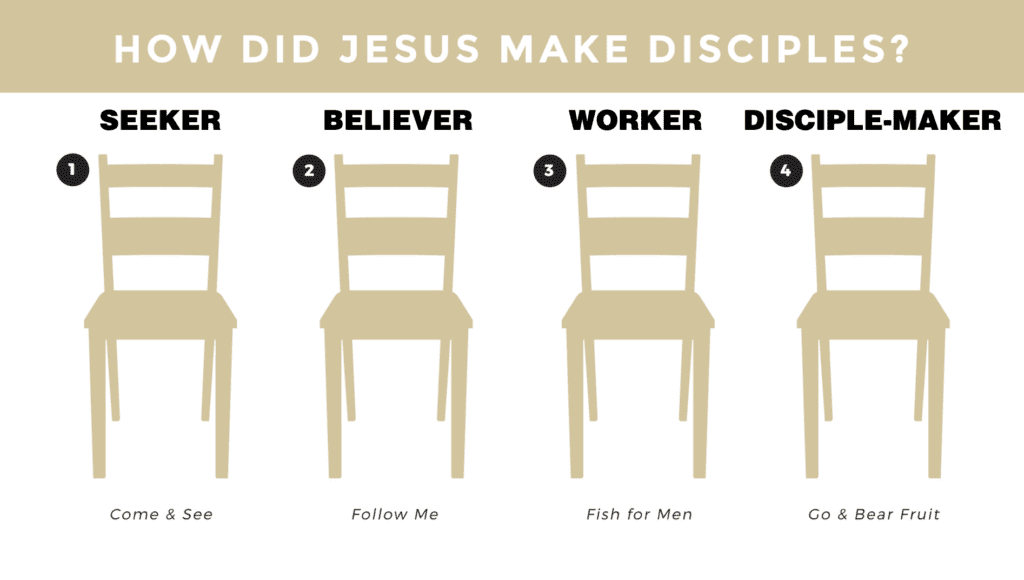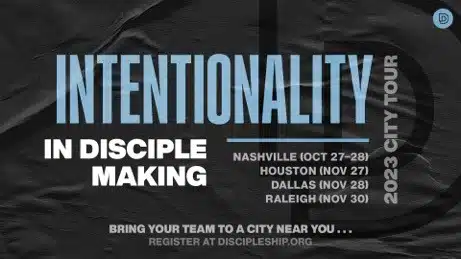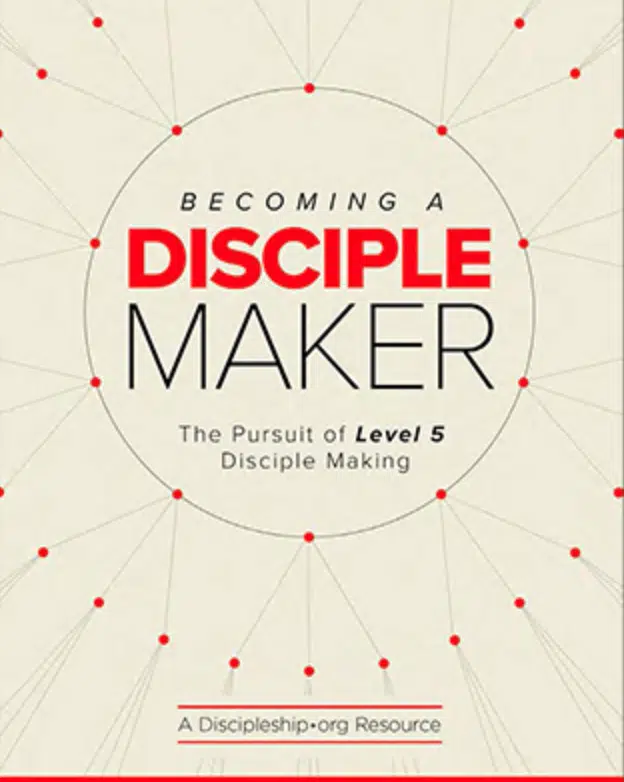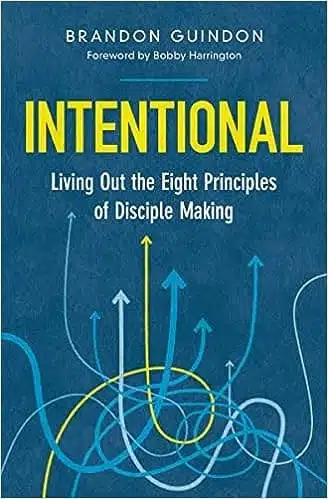How to Identify, Engage and Equip a Team of Harvest Workers

I recently had the privilege of teaching at Word Of Life Bible Institute in Hudson, FL. I’d been invited to come in and teach the new class of students in a week-long course on personal evangelism. Just over 100 students are enrolled this year for the Bible Institute’s one year program in Florida. While many feel called into full-time ministry, either as a youth pastor or a missionary, many others are still trying to figure out where God is leading them. Some have come with practical ministry experience, but most will be getting their first taste of ministry this year. Most are nowhere near ready to lead a ministry. The Bible Institute is like basic training in the military. These students have been dropped off by their parents at disciple-making bootcamp. They will be developing the character and competency needed to be effective harvest workers wherever God sends them. They are beginning to discover the calling God has placed on their lives. As I sat with students during meals and heard their stories and the journey they are on with Jesus, I couldn’t help but think of the Master’s initial disciples and how He developed them into world-changing movement makers.
When it came to identifying His team of harvest workers, Jesus wasn’t looking for superstars, rock stars or rocket scientists. The men He chose were instead described as “unschooled, ordinary men.” The Greek word for unschooled is agrammatoi, literally meaning “without grammar.” They “don’t speak good.” The word for ordinary is idiota. What does that sound like? Yes, a more literal translation of this description of Jesus’ disciples would be bumbling idiots. They were completely ordinary. It’s almost as if we’re meant to say, “If Jesus could use THEM, then He can use anybody. Even me!”
In our last blog, we laid out the case for the initial phase of Jesus’ ministry with His disciples, the Ministry Foundations Phase, lasting 18-21 months. That Phase concludes with Jesus relocating to Capernaum as His home base and challenging Peter, Andrew, James and John to become fishers of people. We looked closely at how Jesus’ initial interaction with these disciples wasn’t His invitation to fish for people in Matthew 4 and Mark 1. Rather, it was His invitation to come and see and then follow me shortly after coming out of His wilderness experience in John 1. In fact, Acts 1 makes clear that all the apostles were witnesses of Jesus’ life and ministry from the time of His baptism on through the resurrection.
It’s important to understand that Jesus’ disciples had believed in Him as the Messiah and began to follow Him long before He issued the challenge to fish for people. He initiated a relationship with them. He invested in them. He got to know them as young men. He knew their struggles, their aspirations, their personalities. He taught them. He poured truth into them. They didn’t arrive at the point of being ready to be invited to fish for people immediately. This was an 18-21 month process where Jesus intentionally discipled them to prepare them to be ready for that next step.
Jesus knew this to be true. We reproduce who we are. Jesus was a disciple-maker committed to reproducing disciple-makers. They would need to experience being discipled by Jesus to be able to reproduce His model and relationally disciple others. It’s the Jesus way.
PHASE THREE: MINISTRY TRAINING / 6-9 MONTHS
Jesus’ training of His disciples to become harvest workers included instruction, modeling and practical ministry experiences. Not a lot is covered during this period in Jesus’ ministry, but it’s easy to see Jesus’ intentionality in everything He did with His young men. Consider His invitation that launches Phase 3.
“Come, follow Me,” Jesus said, “and I will send you out to fish for people.”
Matthew 4:19
Jesus’ invitation is RELATIONAL, INTENTIONAL and MISSIONAL. Jesus invites them to continue their journey with Him (RELATIONAL). He wants to go deeper with them. He wants to spend more time with them. He wants them by His side. But as they come, there is somewhere He will be leading them (INTENTIONAL). He has a plan for His time with them. He has things He wants to see happen in their lives. He has more to show them. And this will involve them getting their hands dirty (MISSIONAL). They will not be mere spectators, along for the ride. They will be contributors. They will be put to work in the harvest fields. They are coming with Him to be sent out by Him.
Here are 15 events in the Ministry Training Phase of Jesus’ Ministry
- Jesus settles in Capernaum
- Jesus calls the Four to be fishers of people
- Jesus heals a demon possessed man in the synagogue
- Jesus heals Peter’s mother-in-law and many others
- Jesus takes His disciples on a ministry tour throughout Galilee
- Jesus gives a second call to fish for people.
- Jesus cleanses a leper
- Jesus heals the paralytic and forgives his sins
- Jesus calls Matthew and dines with his friends
- Jesus teaches about old and new wineskins
- Jesus heals a lame man on the Sabbath
- Jesus claims to be equal with the Father
- Jesus’ disciples pick grain on the Sabbath
- Jesus heals a man with a withered hand on the Sabbath
- Jesus withdraws to the Sea of Galilee and ministers to the crowds
All of these events occur before Jesus appoints the Twelve as His apostles and encompass both Phase 3 and Phase 4, Expanded Outreach, which happen concurrently.
From the time Jesus challenged His disciples to “fish for people” to the time He appointed the Twelve as His apostles, roughly 6-9 months pass. Jesus begins ministry training during this time, and that ministry training will continue once He invites the Twelve to be His apprentice leaders.
IDENTIFYING A MINISTRY TEAM
When we reach the Ministry Training Phase in our youth ministries, it’s important for us to clearly identify who we are going to be training and what our expectations of them will be. These students will be our Ministry Team. We prefer the title Ministry Team over Student Leadership Team because it puts the focus on equipping students to be disciple-makers first before giving them the platform and responsibility of leading their peers.
How do we know who to invite to be on our Ministry Team?
In Mark 3, we see that Jesus called to Him “those He wanted.” Identifying those who would be on His Ministry Team was a natural by-product of relationship. Jesus spent time with them. He knew them. He’d already poured into them. They had been on a journey with Jesus.
In Luke 5:1-11, we see four characteristics that Jesus found in those He chose to be on His Ministry Team. We’ll use the acronym AFTR to outline those four attributes. Jesus was looking for those who were AFTR more.
AVAILABLE (Luke 5:1-3)
In order for someone to be equipped as a disciple-making harvest worker, they must first be available. They must be committed to rearranging their priorities to carve out space in their life for training and ministry opportunities. If someone expresses an interest in being on a ministry team, but can’t commit the time consistently to be involved, they’re not yet ready.
FAITHFUL (Luke 5:4-5)
For those who are available, we should also look for faithfulness in their walk with Christ. Faithfulness is not perfection, but there should be evidence of consistency in spending time with God in the Word and prayer. There should be evidence of simple obedience. Before inviting His disciples to “fish for people,” He first invited them to “Follow Me.” Following precludes fishing. This is what it means to be faithful.
TEACHABLE (Luke 5:6-10a)
In addition to their availability and faithfulness, it’s also essential that anyone joining a ministry team be teachable. They have to be willing to listen and to learn. There are Biblical truths, ministry skills and character traits to be learned when someone is being equipped for ministry. Effective equipping targets the heart, the head and the hands. The students must be receptive to the equipping needed. This is what it means to be teachable.
RESPONSIVE (Luke 5:10b-11)
One last, but certainly not least, characteristic we should see in those stepping onto a ministry team is that they are responsive to the leadership and direction of those leading the ministry. The ministry’s leadership is responsible before God for setting the vision and the strategy for the ministry. If someone steps onto a ministry team with their own vision of where the ministry should go and tries to wrestle away the steering wheel and turn the ministry in a different direction, they’re not fit to be on the ministry team. They can certainly share their thoughts and ideas, with humility and respect, but ultimately they must be willing and able to respond to the vision and direction leadership has set for the ministry.
For those who are available, faithful, teachable and responsive, what exactly are we to equip them for?
Using the analogy of the 4 Chairs from our 4 Chair Discipling training, when a person joins the ministry team, they move into Chair 3. They are now being equipped to be a Worker in the harvest. Their disciple-making harvest work focuses on those who are in Chair 1 and Chair 2. The Worker is being equipped to share their faith with the Lost in Chair 1 and help the Believer in Chair 2 grow in their faith.

EQUIPPING FOR PEER SHARE
Immediately after putting his faith in Christ, Andrew introduced his brother Simon to Jesus. Similarly, Philip immediately went to find his friend Nathanael to introduce him to the Messiah. And the Samaritan woman, after learning that Jesus was indeed the Messiah, hurried to share the news with her neighbors and introduce them to Jesus. It should be natural after someone trusts Christ as their Savior that they want to introduce their family, friends and neighbors to Jesus. None of these new Christ-followers were shy about sharing that they had met Jesus.
It’s another year-and-a-half though before Jesus tells Andrew, Simon Peter, James, John and likely Philip and Nathanael too that He would make them fishers of people. And then it was almost a year later before Jesus sent out the Twelve two by two to preach the gospel on their own. Jesus spent that time preparing them to share the good news by continually teaching them the truths of the kingdom and exposing them to ministry opportunities in a variety of settings with Him.
How do we equip students to share the gospel? We continually proclaim a simple, clear gospel message in our gatherings so the students hear it over and over and over again. We teach them the simple gospel message and have them practice sharing until they can articulate it with confidence. We arm them with practical tools they can use to engage friends in gospel conversations, whether that be books, apps, videos or other creative resources. We expose them to opportunities where they will have to share with others while being coached by us. All of this is why Sonlife is partnering with Moody to put on XJ: Experience Jesus in Chicago next Summer. XJ is an equipping event specifically designed to prepare high school students to live out their faith, defend their faith, and share their faith with their friends.
EQUIPPING FOR PEER CARE
Who better to show a student how to follow Jesus than a peer who is following Jesus. Students are capable of discipling their peers. When a student is available, faithful, teachable and responsive, it means that they are modeling for others what it looks like to follow Jesus for someone their age. They can model for their peers what it looks like to follow Jesus at school, on their sports team, with their friend group, in their personal life and relationships. They can model for their peers what it looks like to align their values and priorities with Christ in the midst of all the pressures they face in this culture. Once they have introduced a friend to Christ, continue to walk with them. Show them how to follow Jesus. Help them learn how to read God’s Word. Pray with and for them. Encourage them, and hold them accountable to walk closely with Jesus.
What did the student in Chair 3 need to help them to grow in their faith? What studies helped to ground them in their new identity in Christ? What tools helped them to be consistent in spending time with God? These are all the things they should be sharing with their friend who they’ve introduced to Jesus. A great tool for discipling their peers is Sonlife I Want To Follow Christ series (5 Booklets: Identity, Walk, Talk, Feed, Clean)
Equipping students for Peer Care can also include teaching them the One Anothers of Scripture, teaching them about their spiritual gifts, teaching them important relational skills like listening and conflict resolution, teaching them about self-sacrifice, servanthood and generosity, and so much more. And of course, with all of these things, the teaching must be accompanied by opportunities to put these ministry skills into practice.
EQUIPPING LIKE JESUS
We see Jesus equipping His harvest workers in a variety of ways. He gathered them for specific teaching. He took them on multiple ministry trips and mission experiences, exposing them to a variety of settings and cultures. He taught them along the way, looking for those teachable moments where He could immediately address something they’d seen or experienced. Before sending them out, He met with them as a team to give specific instructions. In short, Jesus viewed everything as an opportunity to equip. He didn’t miss an opportunity to train and prepare them for the mission He’d invited them into.
In our youth ministry context, we too should view everything we do as an opportunity to equip others to be disciples who make disciples. But we shouldn’t be haphazard or cavalier and just call everything that we do equipping. We should be intentional. Who are we investing in? How do they need to be equipped? What are we doing to train and prepare them for the mission we’ve invited them into? Whatever our rhythm looks like, we should be regularly, consistently meeting with those we’re equipping, both training them and giving them practical experiences to sharpen their disciple-making skills.
This post originally appeared at: How to Identify, Engage and Equip a Team of Harvest Workers – Sonlife
Because of the importance of intentionality in disciple making, we at Discipleship.org are going to emphasize this skill set and mindset over the next four months. Please join with us and seek to share understanding, insight, and practical tools so that you can become skilled at intentionality in relational disciple making and you can help those on your team or in your leadership group to do the same. There are four ways in which we are emphasizing intentionality to help you in the next four months.
- Discipleship.org City Tour Forums – our four City Tour Forums are designed to help you and your team both understand and develop an intentionality posture. The tour is comprised of one day, high impact forums where there will be teaching and round table discussions. Every attendee also gets a copy of Brandon Guindon’s new book, Intentional: Living Out the Eight Principles of Disciple Making.
Click the image below for more information.

Take the FREE Individual Disciple Maker Assessment – we designed this assessment with a team of national and international disciple making leaders to help each individual be able to evaluate their disciple making mindset and skill. Just by taking this assessment, you will gain an appreciation for the value of intentionality, along with a sense of how you can increase your own level of intentionality. Click the image below to take the assessment.

- Read the short FREE book, Becoming a Disciple Maker: The Pursuit of Level Five Disciple Making – Bobby wrote this short eBook with statistician Greg Wiens to help you understand the mathematical and practical impact of one person’s disciple making efforts and skills.
Click the image below to download this free eBook.

- Read Brandon Guindon’s book, Intentional: Living Out the Eight Principles of Disciple Making – Brandon wrote this Discipleship.org book and Zondervan is publishing, because the understanding and practice of disciple making is so crucial. Every attendee at each of our City Tour events (Nashville, Houston, Dallas and Raleigh), as mentioned above, will receive a FREE copy of Brandon Guindon’s book.
Click the image below to order Brandon Guindon’s book from Amazon.com.
Please join with us in this quest to better understand and practice intentionality. It will help us all to become more and more like Jesus, the world greatest disciple maker.

If you have enjoyed reading this, please consider joining our email list!











